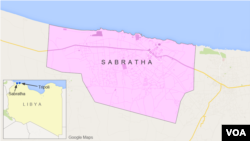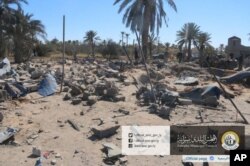U.S. warplanes attacked an Islamic State training camp in western Libya Friday, near the border with Tunisia, hitting their main target and killing dozens of terrorist recruits.
Defense officials in Washington said the airstrike most likely killed a senior figure in the Islamic State group, Noureddine Chouchane.
“We feel confident this was a very successful strike,” Pentagon press secretary Peter Cook told reporters Friday.
Chouchane was linked to two major terrorist incidents in Tunisia last year: attacks on a museum in Tunis and a beach resort outside the capital, which together killed at least 60 people.
The U.S. attack was aimed at a farmhouse on the outskirts of Sabratha, about 75 kilometers west of Tripoli on Libya's Mediterranean coast. The airstrike, launched before dawn with manned and unmanned aircraft, killed up to 40 people, local reports indicated.
The Pentagon had been watching the Islamic State facility for weeks, according to Cook. At times, the U.S. had seen as many as 60 people involved in training at the facility.
The mayor of Sabratha said many of the dead were Tunisians who had recently arrived at the training camp.
At least one Jordanian was among the victims, the mayor told journalists, and there were a number of survivors.
Britain “welcomed” the strike and authorized the use of its airbases to launch the attack, according to the British Defense Ministry.
US attack
Friday's action was the second American attack on IS in Libya in the past three months.
“We need to confront ISIL wherever it rears its head,” Cook said, “They have encouraged attacks against the United States and our allies.”
Secretary of Defense Ash Carter recommended the strike to the president, who authorized the attack.
"It's an indication that the president will not hesitate to take these kinds of forceful, decisive actions," White House spokesman Josh Earnest told reporters.
In November, a raid in eastern Libya killed an Iraqi known as Abu Nabil, who U.S. officials said was the head of IS operations in Libya.
Earlier this week, President Barack Obama said U.S. forces will take action against Islamic State in Libya, "where we've got a clear operation and a clear target in mind."
"We are working with our coalition partners," Obama said Tuesday, "to make sure that as we see opportunities to prevent ISIS from digging in in Libya, we take them."
Islamic State has expanded operations in North Africa markedly during the past year, taking advantage of the chaos and political uncertainty in Libya since dictator Moammar Gadhafi was overthrown and killed in 2011.
The terror group also has been active in Tunisia, which borders Libya on the west.
Tunisian national
U.S. defense officials said the raid specifically targeted Chouchane, who was a Tunisian national, and did not represent the beginning of a major new offensive in the region. The New York Times reported that reconnaissance drones, satellites and other surveillance tools had been monitoring the walled compound in Sabratha for weeks before Air Force jets were ordered to strike early Friday.
Chouchane was believed to have had a central role in an attack on the National Bardo Museum that killed 22 people in Tunis 11 months ago, and a bloodbath that killed 38 people in June at a coastal resort in Sousse. Foreign tourists were among the victims in both incidents.
Tunisian authorities named Chouchane as one of five fugitives they were seeking after the museum attack.
William Gallo contributed to this report.






